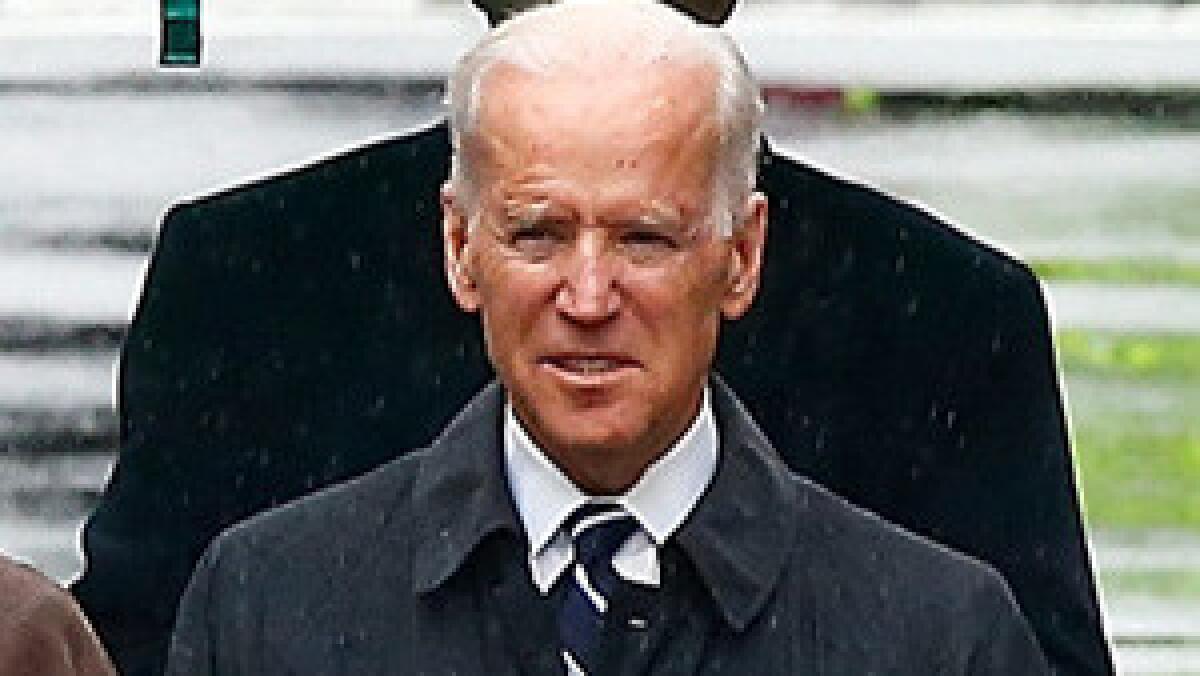Joe Biden will receive Holy Communion sooner or later

- Share via
It might not be this coming Sunday, when he will be campaigning for Democratic candidates in Virginia, but sooner or later Joe Biden is going to receive Holy Communion in a Catholic church.
That fact may explain why Biden reacted with equanimity after a priest in South Carolina alerted the media this week that he had denied the sacrament to the former vice president because of Biden’s support for legal abortion.
The Rev. Robert E. Morey of St. Anthony Church in Florence, S.C., gave this statement to local news organizations:
“Sadly, this past Sunday, I had to refuse Holy Communion to former Vice President Joe Biden. Holy Communion signifies we are one with God, each other and the Church. Our actions should reflect that. Any public figure who advocates for abortion places himself or herself outside of church teaching. As a priest, it is my responsibility to minister to those souls entrusted to my care, and I must do so even in the most difficult situations. I will keep Mr. Biden in my prayers.”
Biden declined to confirm or deny the priest’s claim, telling NBC News: “That’s just my personal life, and I’m not going to get into that at all.”
But if Biden wasn’t commenting, lots of other people were, including journalists penning think pieces (“Biden’s Communion Denial Highlights Faith-Politics“), liberal and conservative Catholics dueling on Twitter and Cardinal Timothy Dolan, the archbishop of New York, talking about it in a TV interview.
Yet if Morey thought his statement about Biden would strike a blow against Catholic politicians who support legal abortion, he miscalculated. What the ensuing discussion has made clear is that the Roman Catholic Church has no single position on whether a politician who supports legal abortion should be denied the consecrated bread and wine that Catholics believe to be the Body and Blood of Christ.
Dolan told Fox News that Morey had a “good point” about the problem posed by a politician who seeks to receive Communion even if he is publicly at odds with a major church teaching. But Dolan indicated that he wouldn’t withhold the sacrament in a similar circumstance.
“I’m not up there as a tribunal, as a judge, distributing Holy Communion,” Dolan said. “I’m there as a pastor, as a doctor of souls.”
Dolan’s comment echoed the view of Cardinal Roger Mahony, the retired archbishop of Los Angeles. In 2011, Mahony told The Times’ Tim Rutten: “It isn’t for us to guess at what’s on someone’s conscience.”
Other bishops disagree. In its story about Morey and Biden, the Catholic News Agency said the priest was following a policy established in 2004 by the dioceses of Atlanta, Charleston and Charlotte.
The fact that the hierarchy is divided on this question is supported by a visit to the website of the U.S. Conference of Catholic Bishops.
There you can find a February column by Archbishop Joseph F. Nauman of Kansas City in which he says that he has found it necessary to request that some pro-choice public officials “not present themselves to receive Holy Communion, for their own spiritual welfare and for the protection of many others from moral confusion.”
Yet the website also features a 2004 statement in which the bishops take a flexible approach, saying that bishops “can legitimately make different judgments on the most prudent course of pastoral action.”
It’s hard to argue that Biden is a bad Catholic — assuming that matters to some voters — if his worthiness to receive Communion depends on where he happens to be attending Mass.
More to Read
A cure for the common opinion
Get thought-provoking perspectives with our weekly newsletter.
You may occasionally receive promotional content from the Los Angeles Times.









